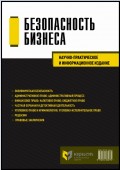Адрес: 115035, г. Москва, Космодамианская набережная, д. 26/55, стр. 7 Тел.: (495)953-91-08,
617-18-88, 8-800-333-28-04 (по России бесплатно)
Военно-юридический журнал №10 – 2021
АКТУАЛЬНЫЕ ВОПРОСЫ ВОЕННОЙ СЛУЖБЫ
-
В статье исследуется правовое положение Федеральной службы безопасности России как органа государственной власти, привлекаемого для выполнения отдельных задач в области обороны Российской Федерации. Применительно к этим полномочиям ФСБ России анализируется правовое положение военнослужащих органов федеральной службы безопасности. Формируются дефиниции правового положения военнослужащих.
Ключевые слова: Вооруженные силы, оборона страны, Федеральная служба безопасности, военнослужащий, правовое положение военнослужащего.
Legal Support of the Participation of the Federal Security Service in the Defense of the Country: Status of Military Officers and Specific Features of Their Military Service
The article examines the legal status of the Federal Security Service of Russia as a state authority involved in performing certain tasks in the field of defense of the Russian Federation. In relation to these powers of the FSB of Russia, the legal status of military personnel of the federal Security service is analyzed. Definitions of the legal status of military personnel are being formed.
Key words: Armed forces, national defense, federal security service, serviceman, legal status of a serviceman.
ВОЕННАЯ ЮСТИЦИЯ
-
В статье анализируются формы коррупционного поведения, которые затруднительно квалифицировать как взятки, однако по сути таковыми являющиеся. Автор приводит нормы законодательства и позиции судов по данному вопросу, приводит примеры деяний, которые не вписываются в формат содержащихся в Уголовном кодексе преступлений. На основе приведенных положений делается вывод о совершенствовании законодательства.
Ключевые слова: взятка, коррупция, нематериальный характер услуг, публичное управление, органы власти, преступления, стимулы для нарушения закона.
Incentives for Avoiding Fulfilment of the Duties or Hidden Forms of Corruption
The article analyzes the forms of corrupt behavior that are difficult to qualify as bribes, but in fact they are such. The author cites the norms of legislation and the positions of the courts on this issue, gives examples of acts that do not fi t into the format of the crimes contained in the Criminal Code. Based on the above provisions, a conclusion is made about the improvement of legislation.
Key words: bribery, corruption, intangible nature of services, enrichment of an official, authorities, crimes.
-
В условиях кризиса административной политики закономерно возрождается научный и практический интерес к институту крайней необходимости и иным способам причинения вреда при обстоятельствах, исключающих преступность деяния. Значительность данного направления объясняется также стереотипностью и архаизмом учения о пределах правомерности причинения вреда.
Ключевые слова: правонарушение, крайняя необходимость, причинение вреда, законодательство, деликтность.
The Institute of Urgent Need under the Laws on Administrative Offence of the Russian Federation
In the conditions of the crisis of administrative policy, scientific and practical interest in the institution of extreme necessity and other ways of causing harm under circumstances that exclude the criminality of the act is naturally revived. The significance of this direction is also explained by the stereotypical and archaic teaching about the limits of the legality of causing harm.
Key words: offense, extreme necessity, causing harm, legislation, delicacy.
-
Статья посвящена анализу законодательства в части, касающейся разграничения составов административных правонарушений, предусмотренных ст. 18.7 и ч. 4 ст. 19.3 Кодекса Российской Федерации об административных правонарушениях. В настоящей статье авторы последовательно раскрывают ряд проблем, возникающих в правоприменительной деятельности пограничных органов, и предлагают пути их решения.
Ключевые слова: пограничные органы, административные правонарушения, подведомственные пограничным органам, законные требования, неповиновение законным требованиям.
On the Issue of Distinguishing the Elements of Administrative Offences stipulated by Article 18.7 and Part 4 of Article 19.3 of the Administrative Offense Code of the Russian Federation
The article is devoted to researching legislation in regard to the delineation of the offences under articles 18.7 and part 4 article 19.3 of the Code on Administrative Offences Russian Federation. The authors reveal a number of problems, arising in law enforcement practice of border authorities and offers the ways of solutions.
Key words: border guard authorities, administrative offences under the jurisdiction border guard authorities, legal requests, insubordination against legal requests.
ИСТОРИЧЕСКИЙ ЭКСКУРС
-
В статье исследуется период послевоенного голода 1946–1947 гг. Выявлено, что из-за природно-климатических условий территорию Украины, Молдавии и РСФСР охватила засуха. К середине 1946 г. после гибели урожая зерновых очевидность нехватки продовольствия и наступающего голода становилась неизбежной. Раскрыто, что колхозы и совхозы работали за пределами своих возможностей, сдавая практический весь урожай государству, обрекали на голод своих работников. Установлено, что политику продовольственной безопасности в 1946–1947 гг. можно охарактеризовать как внешнеполитическую, в которой прослеживается цель закрепиться в Европейских странах, освобожденных Красной армией от фашизма. Показано, что из США поступала помощь нашей стране во времена голода 1891–1892 гг., 1921–1922 гг., во время войны 1941–1945 гг., и в 1946–1947 гг., таким образом, мы наблюдаем, что между нашими странами были светлые страницы, которые нужно помнить и исследовать.
Ключевые слова: хлебозаготовки, голод, экспорт зерна, миграция, восстановление.
Post-War Hunger in the USSR (1946–1947): Restoration of the Industry, Collection of Grain for State Grain Stock Pile, Export, Food Aid of the USA
The article examines the period of the post-war famine of 1946–1947. It was revealed that due to natural and climatic conditions, the territory of Ukraine, Moldova and the RSFSR was covered by drought. By the middle of 1946, after the loss of the grain harvest, the evidence of food shortages and the coming famine became inevitable. It is revealed that collective farms and state farms worked beyond their capabilities, handing over the entire harvest to the state, condemning their workers to starvation. It is established that the food security policy in 1946–1947 can be characterized as a foreign policy, in which the goal is to gain a foothold in the European countries liberated by the Red Army from fascism. It is shown that the United States provided assistance to our country during the famine of 1891–1892, 1921–1922, during the war of 1941–1945, 1946–1947. Thus, we observe that there were bright pages between our countries that need to be remembered and explored.
Key words: grain procurement, famine, grain export, migration, recovery.












